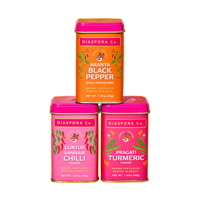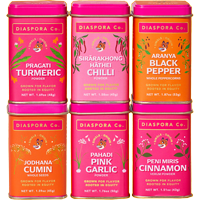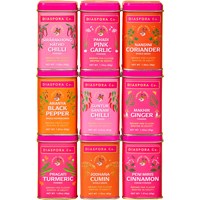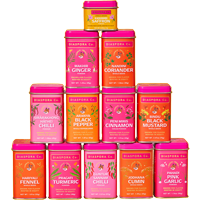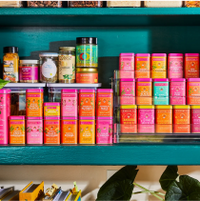
Saag-shuka pulls inspiration from two of my favorite dishes saag and shakshuka. Traditional saag can be any combination of leafy greens—spinach, mustard greens, kale, swiss chard, you name it. A favorite in northern and northeastern India, saag recipes vary region by region and household by household (you can find our recipe for traditional saag here). Shakshuka—traditionally made up of eggs poached in a thick, spiced tomato and pepper sauce—can be found in many cuisines, from North African and Palestinian to Iranian and Persian cooking. Just like saag, there is no one recipe for shakshuka. Some are tomato heavy, others filled with red peppers, some with harissa and others topped with feta—the one thing every shakshuka has in common is that they are all truly delicious.
This playful dish starts with leeks instead of the classic onion, plus ginger, garlic and plenty of green chillies. Flavored with garam masala, Pragati Turmeric and Guntur Sannam Chillies, the base is rounded out with a generous amount of tomatoes and briny, zesty preserved lemons. Here, I'm using kale and mustard greens, but you can use whatever greens you have on hand. If you want a little extra spice, you could also throw in a spoonful of harissa! Though shakshuka is often served for breakfast, I would happily eat this saag-shuka morning, noon or night.

Asha's Saag-shuka
Saag-shuka pulls inspiration from two of my favorite dishes saag and shakshuka. Traditional saag can be any combination of leafy greens—spinach, mustard greens, kale, swiss chard, you name it. A favorite in northern and northeastern India, saag recipes vary region by region and household by household (you can find our recipe for traditional saag here). Shakshuka—traditionally made up of eggs poached in a thick, spiced tomato and pepper sauce—can be found in many cuisines, from North African and Palestinian to Iranian and Persian cooking. Just like saag, there is no one recipe for shakshuka. Some are tomato heavy, others filled with red peppers, some with harissa and others topped with feta—the one thing every shakshuka has in common is that they are all truly delicious.
This playful dish starts with leeks instead of the classic onion, plus ginger, garlic and plenty of green chillies. Flavored with garam masala, Pragati Turmeric and Guntur Sannam Chillies, the base is rounded out with a generous amount of tomatoes and briny, zesty preserved lemons. Here, I'm using kale and mustard greens, but you can use whatever greens you have on hand. If you want a little extra spice, you could also throw in a spoonful of harissa! Though shakshuka is often served for breakfast, I would happily eat this saag-shuka morning, noon or night.
Ingredients
For the saag-shuka
- 2 tablespoons extra virgin olive oil
- 2 tablespoons ghee, store-bought or homemade
- 1/2 teaspoon Hariyali Fennel
- 1 large leek, whites and light green parts only, thinly sliced
- 1/2 inch piece fresh ginger, peeled and minced
- 2 large garlic cloves, minced
- 2 Indian green chillies or 1 serrano, finely chopped
- 1 1/2 teaspoons Garam Masala
- 1/2 teaspoon Pragati Turmeric
- 1/2 teaspoon powdered Guntur Sannam Chillies
- 4 plum tomatoes, roughly chopped
- 2 tablespoons preserved lemon, roughly chopped
- 1 teaspoon kosher salt
- 1 large bunch kale, hearty stems removed and leaves roughly chopped (about 4–5 ounces)
- 1 large bunch mustard greens, hearty stems removed and leaves roughly chopped (about 4–5 ounces)
- 1/2 cup cilantro leaves and tender stems, roughly chopped
- 4–6 large eggs
- Fresh dill, for serving
For the tadka
- 3 tablespoons ghee, store-bought or homemade
- 1 teaspoon Bindu Black Mustard seeds
- 1/2 teaspoon Jodhana Cumin
- 1/2 teaspoon Hariyali Fennel
- 2 whole Guntur Sannam Chillies
- 1/2 teaspoon powdered Guntur Sannam Chillies
For serving
- Warm pita, chapatis or thick slices of toasted bread
Methods
- Heat the olive oil and ghee in a large skillet over medium heat. Add the fennel seeds and sauté until they just start to turn light golden, about 1 minute. Add the leeks and continue to cook, stirring occasionally, until they turn translucent and start to caramelize, about 3–5 minutes. Add the ginger, garlic, green chillies, garam masala, turmeric, powdered chillies and continue to cook for another 2 minutes. Add the tomatoes, preserved lemon, salt and 1/2 cup water and cook, stirring frequently, until the tomatoes start to break down, about 2–3 minutes.
- Add half the greens and stir to coat in the spiced tomato mixture. Allow the greens to wilt for a couple minutes and then add the remaining greens, stirring again. Cover and cook until the greens are cooked through and very tender, about 15 minutes. Turn off the heat, stir in the cilantro and allow to cool for 5 minutes.
- Transfer half of the greens to a food processer or blender along with another 1/2 cup of water and blend until smooth. Transfer the blended greens back to the skillet, mixing them with the remaining chopped greens and place back on medium heat until reheated through. If the mixture is a little thick, add a few tablespoons of water at a time until it reaches your desired consistency. Make 4 to 6 wells in the greens mixture, depending on the number of eggs you're using, and carefully break one egg into each well. Reduce the heat to medium low and cook until the egg whites are set, but the yolks remain runny, about 5–6 minutes.
- While the eggs are cooking, make the tadka. Heat the ghee in a small skillet or saucepan over medium heat. Add the mustard seeds, cumin, fennel and whole chillies and cook, swirling the spices, until the mustard seeds start to pop and sputter, about 1 minute. Turn off the heat, add the powdered chillies and mix well.
- To serve, spoon the tadka over the saag-shuka and garnish with fresh dill sprigs. Enjoy with warm pita, chapatis or thick slices of toasted bread.




